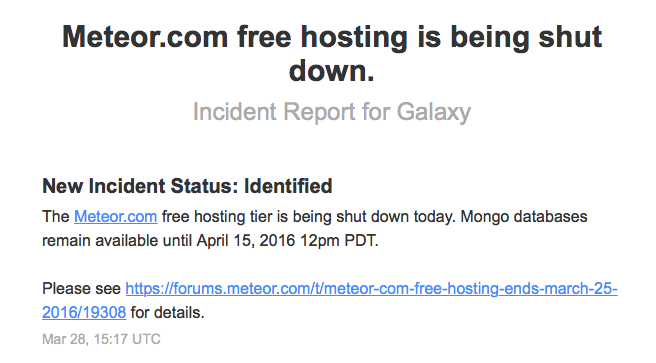It’s this simple guys, really. They didn’t expect such a huge uptake in usage. Speaks volumes on how kickass Meteor is. 
I wonder if it would have been possible and better to seek more VC funding in order to maintain free hosting. VCs are more likely to provide funding wherever there is great traction. Think of the history of YouTube and maybe many other big names.
YouTube other big names are B2C companies with tremendous amounts of user traction - millions of users. You won’t wow VCs with likely profitability of Galaxy. Userbase is “low” compared to B2C markets, thus scale has to be considered more pessimistically especially since Meteor & Galaxy haven’t proven yet that they can scale this. All they’ve proven is that they can throw an open source framework out for free and people will use it and they have a few paying customers. Technically they’ve just validated their (commercial) MVP in the last months and are ssentially entering growth stage right now so first they’ll have to prove that their MVP can grow bigger and make revenue now.
Thanks for the clarification @debergalis. It seems like some sound reasoning went into this decision and it’s good to hear it. One question:
If one of the major issues is with the number of apps running, is there any way that you could just delete apps older than say 24 hours, so that people have the ability to test out an app (especially a mobile app), for free for a short window of time? As long as people are warned about this limited time, it shouldn’t be a problem and it should reduce the number of apps and the storage needs on your end. The ease of meteor deploy is huge for beginners.
Yes, a free-for-24-hours feature is possible. (I’m actually quite fond of
the idea.) But it has to be a Galaxy feature. We’re not going to run two
parallel deployment systems, especially when one of them doesn’t have the
monitoring hooks necessary to diagnose problems and automatically page
engineers.
As @debergalis mentioned above, we are working with a select group of package authors to migrate their demo/doc sites from Meteor.com free hosting to Galaxy, free of charge. See the details here.
Also, we’ve formalized the ability to request access to Galaxy Community Sandboxes, a free version of Galaxy that lasts for 7-days, no credit card required. While we’ve supported community events (e.g. hackathons, workshops, and Meetups) with generous Galaxy credits in the past, Galaxy Community Sandboxes will make it even easier for event organizers to provide a great deployment option for Meteor apps. We can’t wait to see how the community will put these to use in future events!
I’ve spent countless hours developing small, useful, open source Meteor apps, all of which use free *.meteor.com hosting. I had no plans to aggressively monetize them, or to try and drive large amounts of traffic: I just wanted something that worked for super small-scale use and as a working demo for folks who wanted to self host.
When Galaxy first came out, I was worried the existing hosting would be axed, and that I would have to move to a framework that is simpler to host. I went and read through everything I could find, and was incredibly relived to read that the free meteor deploy myapp.meteor.com hosting would never be axed. The effort I’d put into free, open-source apps with demo instances hosted on *.meteor wouldn’t be wasted!
The combination of a broken promise, poor communication, and an absurdly short shutdown window makes me wary of investing in the Meteor ecosystem further.
Here are two of my more developed apps, neither of which I had launched or promoted, but both of which I have been using and developing for many months:
readb.meteor.com
ReaDB — read. review. remember: an open-source (423 commits over here) self-hosted Goodreads alternative.
mark-down.meteor.com
A little utility to preview and print markdown — either something you paste in or loaded from a GitHub Gist ID — using different typographic presets.
Enjoy the demos while they last.
My Opinions:
-
I think what is coming now, free hosting for Community Websites and important packages. People like TheMeteorchef make a huge impact to the Meteor community and their free code examples should be supported so they don’t have to deal with costs when they provide free tutorials for the community. The same goes with important packages which should be free to view as a demo.
-
The magic deploy meteor.com is still a big thing and we should try to find together a way to keep it alive in a new way. I like the idea that the app is destroyed within 48 hours. When Galaxy was first announced a lot of people were shocked about the prices and also that there was no free tier. I think that shows well what the community expects and wants. Isn’t it a bit that easy deployment which made Meteor so unique?
Hope we can figure a way out.
Just a suggestion, and maybe not easy or maybe too late, but if you could have converted the old ‘meteor deploy’ to the free meteor.com hosting into something that used one of these new 7 day Galaxy Sandboxes you could would have been left with the following benefits:
- Being able to leave ‘meteor deploy’ in the meteor tutorial (retaining the ‘wow, meteor apps are so simple to deploy to the web’ factor that was the experience many of us had when we first did our first meteor tutorial.) Something that arguably had some part in impressing people with the overall platform and keeping them going with it.
- Expose potential new customers to Galaxy - ie provide a way for them to convert from the free sandbox to a paid subscription at the end of the 7 days.
- Still not be left with tens or hundreds of thousands of minimal-value apps being hosted. Ie 98% would expire and disappear after 7 days.
Just some thoughts.
@marktrang: but isn’t this a bit short sighted?
Okay, perhaps you manage to prevent the deletion of a few useful apps/package-showcases, but isn’t destroying the past just the beginning of destroying the future?
I’m relatively new to meteor so I don’t maintain a package which is used by more than a handful of users, but losing the ability to showcase a packages without spending 23$ a month is kind of insane.
Having to pay as long as you don’t belong to the “select group” doesn’t lead anywhere in my opinion and will lead to stagnation in package development.
Why should anyone continue his/her work on a package which makes meteor what it is?
And why should a beginner even start developing packages?
By the way: why did you kill developer subscriptions? - for most community packages spot instances with 20% downtime and delays would be good enough. I don’t think that there has to be a free option, but going from free/13$ to 23$ is a harsh move. Couldn’t there be a really bad option for open source projects and packages for ~5€? Which is still a lot, having in mind that this is a full DO instance.
Is actually feels like your destroying the ground of meteor.
Looking forward to see where this path goes…
The end of free hosting at Meteor.com doesn’t prevent Meteor package contributors from showcasing their work. There are free hosting options (Heroku+MLab) and also simpler options like just better documenting your package on Github.
As for the recent pricing changes for Galaxy, we received overwhelming feedback that Developer Edition customers wanted more pro-grade features so that’s where we’re focusing. If you compare Galaxy to other PaaS hosting options (e.g. Heroku, Modulus), you’ll find that Galaxy prices are comparable or even cheaper in some cases. Since Galaxy itself is built on top of AWS, it will never be as cheap as the underlying bare metal cloud infrastructure (e.g. AWS, Digital Ocean). As a developer, you can definitely find very affordable bare metal options as you indicated; the tradeoff will be your time to setup the devops stack required to run a production Meteor app and also the lack of any Meteor-specific vendor support. Galaxy may not be a perfect fit for all customer segments but since we launched last fall we’ve definitely proven it’s a great option for team building production apps.
Hi Dan,
Where? I can’t see either in my galaxy or Meteor account settings.
Simply log a ticket from Galaxy and the support team will help you out. In terms of account cancellations-- most people are looking for billing to stop so they just stop their apps instead of shutting down their account. We can send you a link to update your credit card information at any time.
I totally respect if you don’t want to answer this, but I’m too curious not to ask  .
.
I’m assuming that MDG evaluated Heroku’s business model and concluded that it wouldn’t work out / be ideal for you?
I’ve used Modulus, Heroku and meteor.com. But not Galaxy yet. I’m curious as to why you’re recommending users to try out Heroku, aren’t you losing business that way? A big part of onboarding a PaaS is to just learn how to use it. Once you know one, you’re not that inclined to switch, unless you’re missing out on something. Herokus feature set is awesome, I must say. What are the unique offerings of Galaxy, why would I learn to use it instead of Heroku?
So we have the 26th of March 2016. People who deploy today on *.meteor.com don’t even get a message that the service is getting shut down. They come to chats and ask for some details on why some particular feature isn’t working on a freshly deployed app, unaware of the fact that the service got officially shut down a day before.
It would be nice if there was such a thing.
Yes, and “meteor deploy” is still documented.
http://docs.meteor.com/#/full/meteordeploy
MDG definitely has a problem with communication.
I understand why they have to remove this feature, the way they manage it is just terrible.
We ran into some speed bumps editing Transmission 10! Hopefully it can come out on Monday.
Basically everyone is really hard at work trying to release Meteor 1.3.
Sorry about the issues in communication. We had expected a lot of the documentation to be updated through the release of Meteor 1.3, but our timing didn’t quite work out. We should have done better; I apologize and thank you for your patience and understanding.
Updated http://status.meteor.com/ as we start shutting down the free tier infrastructure today. As announced initially, Mongo databases can still be accessed until April 15, 2016 12pm PDT.
Fare thee well meteor.com free hosting - thank you so much for your wonderful years of hosting greatness. You will be remembered fondly, and missed dearly …



